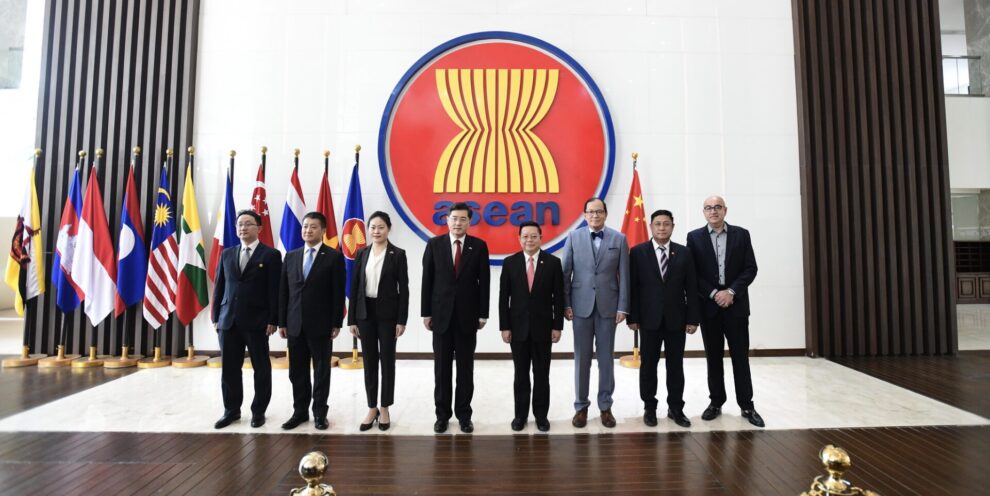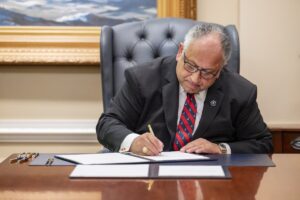Qin Gang’s trip to Indonesia – his first visit to Southeast Asia since his appointment as China’s foreign minister last year – has shown that Beijing is increasingly concerned that the region is leaning more towards the United States, analysts said.
While the agenda for Qin’s two-day trip this week was dominated by trade and infrastructure development, statements from the Chinese side, as well as remarks by officials from both countries, revealed growing unease about a rivalry between China and the US, according to diplomatic observers.
The anxiety, they said, reflected the challenges both the US and China face as they try to nudge Asean countries to pick sides on particular issues.
“China has always been worried about the US getting a foothold in Asean and Southeast Asia, and that is borne from the fact that China has many points of contention with Asean countries that the US does not,” said Dylan Loh, an assistant professor of public policy and global affairs at Nanyang Technological University.
“The sense that US presence is welcomed in the region causes a source of irritation and anxiety.”
The independence of the Association of Southeast Asian Nations and China’s commitment to resolving issues in the disputed South China Sea were at the centre of Qin’s discussions in several meetings with Indonesian and Asean officials on Wednesday.
During a meeting with his Indonesian counterpart Retno Marsudi, Qin repeated that China supported Asean’s strategic independence and upheld its centrality, while being opposed to bloc politics and camp confrontation.
Retno agreed, saying Asean countries should not become a proxy for any power. She pledged to speed up talks over the South China Sea code of conduct between China and other member nations.
A statement from China’ foreign ministry also quoted Indonesian President Joko Widodo as saying that Asia should be the centre of global economic growth rather than “the stage for power struggles”.
Amid the war in Ukraine and growing geopolitical tensions, Qin told Kao Kim Hourn, Asean’s secretary general, during a meeting in Jakarta that the Asia-Pacific region faces a choice between peace and confrontation, cooperation and division.
Qin said China was willing to join hands with Asean to face challenges, and reject “decoupling” and “erecting walls”.
China has been pressing Asean not to choose sides for some time, with Beijing preferring that Southeast Asian countries not align or support the US, according to Chong Ja Ian, an associate professor of political science at the National University of Singapore.
“That said, despite the language of ‘not choosing sides’, I would not rule out Beijing desiring some support from states in Southeast Asia, even if they do not initially win over all Asean members,” Chong said.
The Philippines, meanwhile, is considering a trilateral defence pact with Japan and the US, as its tensions with China grow.
Recently, the Philippines signed a deal with the US granting the American military access to four more army bases – some near Taiwan – and it is planning joint military exercises with the US and Australia in the South China Sea.
“Recent efforts by the PRC [People’s Republic of China] to more robustly assert their claims in waters disputed with the Philippines, as well as the proximity of a designated missile test area in exercises near Taiwan last August, likely convinced Manila of a need to bolster defence cooperation with their US treaty ally,” Chong said.
“Beijing probably would prefer to see this not happen, and would be applying pressure where necessary, including diplomatic pressure.”
By focusing on communication instead of demonstrating its capacity for force, China could assure Southeast Asian states of Beijing’s willingness to engage in self-restraint, while avoiding miscommunication and miscalculation, he added.
Beijing has also said it supports Asean’s intention to handle the Myanmar issue based on a “five-point consensus”, which Loh called “low-hanging fruit” that China could use to prove that it is sincere in standing with Asean.
The five-point consensus is an agreement that was hammered out between Asean and Myanmar’s junta in April 2021 that called for an immediate end to violence and dialogue between the military and rebels.
However, China’s insistence that Asean countries not choose sides should also be applied to itself, said Loh, who added that Beijing continues to try to convince nations to choose it over Washington in domains it has a leverage in.
“There is a sense of urgency for China to make its presence felt and push for maximum influence in the political and economic spheres. They are contesting for influence in Southeast Asia, and despite what Qin Gang says, both countries will make Asean countries choose in particular fields,” Loh said.
Source : South China Morning Post
















